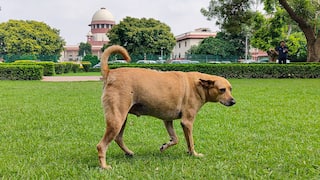Warning Issued Against Viral ‘Dragon’s Breath’ Trend In Indonesia After 20 Children Fall Ill
Indonesia warned people against consuming liquid nitrogen after more than 20 children were harmed after eating a street snack, which is at the center of a new viral video known as “dragon’s breath”.

New Delhi: Indonesia has issued a warning for people against consuming liquid nitrogen. This comes after more than 20 children were harmed after eating a street snack, which is at the center of a new viral video known as “dragon’s breath”, CNN reported. The snack is also known as “dragon’s breath”. It became a trend on TikTok in which children recorded themselves eating it with smoke from the liquid nitrogen coming out of their mouths.
Locally known as ”chiki ngebul”, the snack is named after a popular Indonesian brand of packaged snacks, reported Jakarta Times. After the incident broke out, the ministry urged parents, teachers, and local health authorities to be vigilant. According to CNN, the candies are dipped in liquid nitrogen to create a vapor effect when eaten. Many children have uploaded clips on the video app TikTok in which they can be seen blowing the fumes out of their mouths, noses, and ears.
According to Indonesia’s Health Ministry, the children suffered burns to their skin, stomach pains, and food poisoning after consuming the colorful candies, CNN reported.
Around 25 children fell ill after consuming the candies. Two of them were hospitalised, said the ministry’s director general Maxi Rein Rondonuwu. No deaths have been reported. Although the use of liquid nitrogen in food preparation is not illegal but can turn out hazardous if not used properly.
”Liquid nitrogen is not only dangerous when consumed, but it can also cause severe breathing difficulties from nitrogen fumes that are inhaled over a long time,” Maxi said, as quoted by CNN.
ALSO READ: Peru Police Use Tear Gas To Block Marching Protesters Demanding Prez Boluarte Resignation
According to the ministry, the first case was reported in July 2022, when a child from a village in the Ponorogo Regency in East Java suffered cold burns on his skin after eating a snack.
The month of November and December saw more such cases. One of the cases was of a 4-year-old boy, who was admitted to a hospital in Jakarta with severe pain in the stomach. “Schools must educate children in the community about the dangers of liquid nitrogen in food (to) prevent more cases of severe food poisoning,” Maxi said.
Related Video
Breaking News: Maharashtra Politics Shifts: Congress Suspensions Boost BJP Ahead of Local Body Polls





































